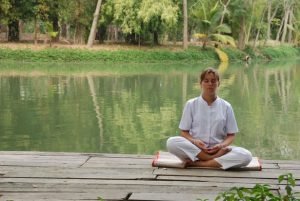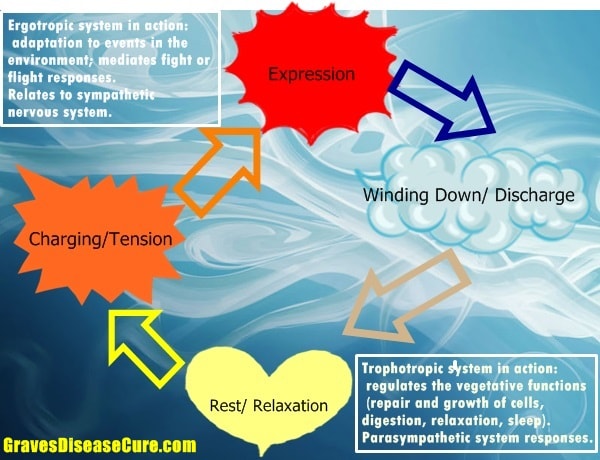
Graves’ disease, hyperthyroidism and the benefits of meditation
by Svetla Bankova
 You are just sitting with closed eyes (usually on the floor, but you can do it on a chair if you have a certain condition that is restricting you), for a certain period of time (usually 30-45 min), your spine straight, and of course you can use a pillow for support. Your cell phone should be off, TV off as well, kids with the other parent, baby sitter or another caregiver…No distraction, no music, just you and the silence (for the purpose of measuring the time, you can use the alarm of an old fashioned clock). Nothing else. And the most important- you’ll be thinking, so don’t try to stop your thoughts. This is not the purpose of meditation!
You are just sitting with closed eyes (usually on the floor, but you can do it on a chair if you have a certain condition that is restricting you), for a certain period of time (usually 30-45 min), your spine straight, and of course you can use a pillow for support. Your cell phone should be off, TV off as well, kids with the other parent, baby sitter or another caregiver…No distraction, no music, just you and the silence (for the purpose of measuring the time, you can use the alarm of an old fashioned clock). Nothing else. And the most important- you’ll be thinking, so don’t try to stop your thoughts. This is not the purpose of meditation!
So, it’s supposed to be simple. But believe me, it’s not that easy at all! It was unbelievably difficult for an active person like me just to sit down and do nothing. It was a punishment. I thought I would go crazy.
Doing NOTHING is something that I never did before. If I am sitting, I’ll be reading a book, watching a movie, checking my mail, paying bills, etc. If I am on my feet, I can do hundreds of things at once (I was so proud to be multi- tasking once). The meditation was a new thing and I discovered a whole new world out there, and actually inside me. Because see, all people who have Graves’ Disease are usually concentrated on the outside world, not the inside. All their thoughts and actions are pointing the world and people outside. They rarely pay attention to what they personally want and what happens inside them. Well, I have to admit that this is me as well, or at least was…
Meditation changes your life for good.
Meditation was the place where I made all my important decisions about my life and its course, that led later to my Graves’ disease healing, so speaking. It was like a well of wisdom, to which I did not have any access before, but now I did, and I used it.
How Graves’ disease and hyperthyroidism relates to meditation?
Chronic stress, as you probably well know, leads to adrenal exhaustion or adrenal fatigue, which badly affects your auto-immune system. I did not met a single person with Graves’ disease who wasn’t at tremendous stress. The stress situations can be explained on a biological level with the activity of sympathetic or parasympathetic nervous system, so called Vasomotoric cycle, as shown below. Graves’ disease patients are usually stuck in the upper left quadrant of the picture:

In Graves’ disease patients, as reported by the researchers Fukao and colleagues in 2003, it was found that stress scores of life events correlated significantly with serum TSH receptor antibody activity and thyroid volume, meaning that when patients had stressful life events, their antibodies worsen. Many other studies confirmed a similar correlation. Don’t forget that stress is psychological, i.e. it is induced by your mind and thoughts, not physical (unless, of course, you are in a car accident, or you are facing a hungry lion).
Meditation, I repeat, is the best, free, convenient, 100% safe and easy accessible way of managing your stress levels- and thus improving the performance of your immune system! If you practice meditation just for 8 weeks, I promise you’ll see a tremendous change in your condition!
Other benefits of meditation
·Stress release
·Calmness and inner quite
·Reduced negativity
·Focused concentration
·Instant energy, inner peace and mental clarity
·Living in the present, instead of worrying about the future and feeling guilty about the past- it helps anxiety.
·Alleviates chronic ailments like insomnia and anxiety, and yes, it helps!
·It helps you to stop being angry, resentful, depressed, anxious and frustrated!
Many people approach meditation as another technique to study at an evening class, like aerobics and pottery. But after a few sessions people often realize that mediation is much more. With practice, meditation becomes a mode of living and a new way of seeing everything: relationships, work and home life, your past, present and future.
Meditation is a profound act of self- love.
Now, if you can’t do that sitting Zen meditation I am talking about, do an active one, no problem. What is an active meditation? Any moving meditation in which you forget about everything else and just relax. For me, it was the Argentinian tango, and walking (slowly, not running) around my neighborhood, or writing.
Why is dancing a meditation? Well, for one thing you have to concentrate on what you are doing, where are you stepping, and how are you holding your partner. It requires your undivided attention. Your body becomes your temple.
So, find your best type of meditation and more often you do it, the better. My suggestion for you- at least give it a try! There is nothing you can loose, you can only benefit. For other Alternative Methods, click here:
In my ebook “Life Manual for Graves’ Disease and Hyperthyroidism” I also included a special Meditation Plan, for those who have difficulties implementing it in practice.
Take care and I really hope that meditation will help you, as it helped me!
Svetla

